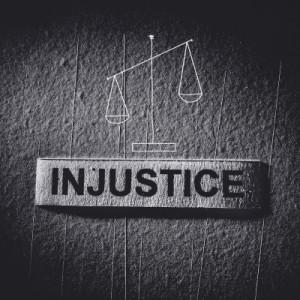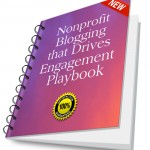Did you know today is Blog Action Day? It’s a day when bloggers all over the world get together to shine a light on one single thing that’s not going right in our world.
We shine this light on Blog Action Day so that, together, we can fix things.
There’s an old Jewish parable that begins with the notion that at one time everything in the world was perfectly balanced. It was “tzedek” (balanced) – which happens to be the root of the word “tzedekah” ( justice) and the term for the money that is collected by every Jewish community to take care of its poor. Our goal, throughout our lives, is to do what we can to get back to that equilibrium. That time when there was no injustice. No unfairness. No fighting. No wars.
There are, alas, always wrongs that need righting.
This year the Blog Action Day organizers have selected a topic that couldn’t be more timely. We hear about this topic, sadly, every day. And it’s happening – more and more – all over the planet.
This year, we’re focusing on the growing problem of #inequality.
It’s common to hear folks talk about what’s happening in the third world, far from our shores. Perhaps it’s easier to stomach when we don’t have to see it. To live with it. We send a check to Africa; then go on our merry way.
Guess what? Inequality is right here. Big time. In our own back yard.
One of the organizations I’ve had the genuine pleasure to work with this year is Opportunity Fund in California. In a list of the poorest places to live in the U.S., California (traditionally thought of as a rich and “golden” state) is by no means immune. In fact, economic disparity is growing throughout the U.S., with big cities becoming especially economically segregated. In California, 1 in 5 people have less than $1,000 in the bank. That’s a lot of people on the brink of disaster. An illness. Loss of a job. An accident. Just about anything can tilt things in such a way that these folks may not be able to pick themselves back up.
It’s not an easy problem to fix. But we have to try.
A teaching from Pirkei Avot in the writings about the Torah dealing with ethics states: “It is not incumbent upon you to complete the work, but neither are you at liberty to desist from it”.
Opportunity Fund is addressing the problem of inequality with a unique approach: microfinance. They do two main things:
1. Fund low-income, struggling would-be business owners so they can get a start towards fulfilling their dream… starting a business… creating jobs… and ultimately, becoming the lynch pin for sustaining themselves and, on average, three additional families.
For those with resources – who grow up in the right zip code, have well-off parents, attend a good college, have lots of business connections – the future looks bright. For those who grow up in barrios, slums, rural and isolated areas, who know no one who has even attended college – the same future looks bleak. What can these folks do to succeed? Starting a business is hard without support. And 45% of small businesses fail because they are unable to get the loan they need.
Enter Opportunity Fund.
2. Teach low-income, under-educated families how to build their savings (including savings matches as incentives) so they can send their kids to college, fund their own dreams and pull themselves up and out of the recurring cycle of poverty.
For those who can’t pay rent and have to choose between feeding their kids and going to the doctor, building savings seems perpetually out of reach. And without savings, college is not an option. Did you know a child is 7 times more likely to attend college if she has a savings account in her name?
Enter Opportunity Fund.
I’ve picked this one example, because it’s one place – not the only place – to start.
Start wherever you are comfortable. Don’t put it off.
The world will not fall back into balance on its own. It won’t repair itself. The more we muck with things, the more we have to dedicate ourselves to the task of unmucking.
It’s what an entire generation in the ‘60’s — the “Love Generation” — was attempting to do. They hoped to shift the culture back to Eden. Back to Nirvana. Back to a time when injustice was not tolerated. When everything fit perfectly together. When all was beautifully balanced: light and dark, day and night, waters above and waters below, dry land and oceans, fish and birds, animals and creepy crawling things, trees and grasses, fruits and vegetables, HUMANITY: male and female. The signature musical of that “Summer of Love” was Hair, which embodied this movement with the song “Aquarius/Let the Sun Shine in:”
Harmony and understanding – sympathy and trust abounding
No more falsehoods or derisions – golden living dreams of visions…
Equality is something that is central to our being. So central, in fact, that all the major religions set aside one day each week – the Sabbath – to spend on inhabiting a special place where all is equal. Balanced. Perfect. Whole. Complete.
Equality.
Want to shine a light somewhere this year to increase equality? You don’t need a blog to participate. Think about a donation to Opportunity Fund; then read these stories about the lives of real people whose lives were made more whole because people like you cared.
Or do something else. Inequality is all around us and, sadly, not at all hard to find. It’s not a good thing. It throws things off balance.
Let’s resolve, together, to do a good thing – or two or three – in the coming year. Let’s get into the practice of rebalancing.
As San Francisco Rabbi Peretz Wolf-Prusan (who recently officiated at my wedding, putting me and my husband into a lovely state of harmonious balance) writes:
All things need to be in harmonious balance with one another: the fruit on the scale and the stones used to measure their weight; the sentence of the judge and the crime committed… Why then must you add more tzedek in the world? What has been thrown out of balance? How many ways are there to set things in balance again?
There are many ways you can set things in balance again.
Look for where you see the darkness creeping in around you. Around others. Do what you can to let the sun shine in.
NOTE: I have the habit of falling in love with many of the organizations I work with. That’s why I’m giving to Opportunity Fund. To reduce obscenely rising rates of inequality in the state where I live. You may share my same habit. So give where you’ve fallen in love, wherever it makes sense to you. But do consider making a gift, somewhere, to honor Blog Action Day this year. And feel free to tell them I sent you. It will make our planet a better, fairer, more equal, more balanced place. Thank you.
Please share this post with others who may want to join the good fight.
Want to Start a Blog and Get Ready for Next Year’s Blog Action Day?
Check out my Nonprofit Blogging That Drives Engagement Playbook. Blogging is my absolute favorite communications medium for nonprofits, and I’ve taken everything I’ve learned about blogging and engaging nonprofit communications and tucked it into 4 handy no-nonsense guides to help you become a “player” in the blogosphere. Once you get going, I guarantee you’ll find the investment in this more than worth it. If not, I’ll refund your money — no questions asked. You can grab all 4 volumes at a special discount, or simply choose one or two that most meet your needs. See you next year for Blog Action Day!
Image courtesy of Freedigitalphotos.net








Claire,
Thank you for the post. I feel very close to this issue recently. I grew up in a middle class family, and was the first of mine to go to college. I thought everything was going swimmingly until the recession in 2009. My family was hit so hard, it knocked us out of the little dream world we were living in.
We lost our house, and I lost my job. Luckily, my husband was still employed, but then his hours were cut.
With a daughter under 2, we found it hard to make rent each month. Checks began to bounce, we borrowed money from everyone we knew.
It became very clear to us then how incredibly difficult it is to be poor. And surprisingly, its quite expensive as well.
Payday loan, title loan type places charges interest rates that really should be illegal. The fees for paying your bills with money orders, the overdraft fees from the banks. The late fees for all your bills that you can’t pay on time. The fees to have your water or electricity turned back on when you finally scrape enough together to pay the bill.
Having to spend so much time in lines for government assistance that there is no time left over to look for work. And then sometimes not even receiving the assistance you waited so long for.
The emotional toll is even worse. My friends avoided me because they knew I might need money. Having the power cut when you’re trying to read your child a bedtime story. Not having running water. Its really terrible.
I can’t even imagine how much worse it is for some.
It took me 2 1/2 years to find work, and I’m still terribly under-employed. But I’m thankful now that I have a job to go to everyday. And at least I was able to get an education – which gives me some peace of mind that I will be able to put my head down, work hard and eventually get back to some sense of what is normal for me.
Some people just aren’t so lucky. They just live that nightmare everyday for their entire lives.
Again, thank you for writing this.
Angie,
Thank you for sharing your very personal and moving story. None of us wants to think this could happen to us, but it can. It does. Which is why fighting this particular fight is so important. One of the things Opportunity Fund does is fight those usurious interest rates, and their goal is to get the word out to would-be business owners that there is an alternative that is fair and reasonable.
I’ve also worked with a food bank, and one of the reasons folks didn’t have enough to eat is that they had no time to fill out all the paperwork required to qualify for government assistance programs. And some of them, though quite impoverished, were not considered “poor enough.” You shine a light on a real problem, right here in our community. I am so glad that things are looking up for you and your family. May it continue to be so.